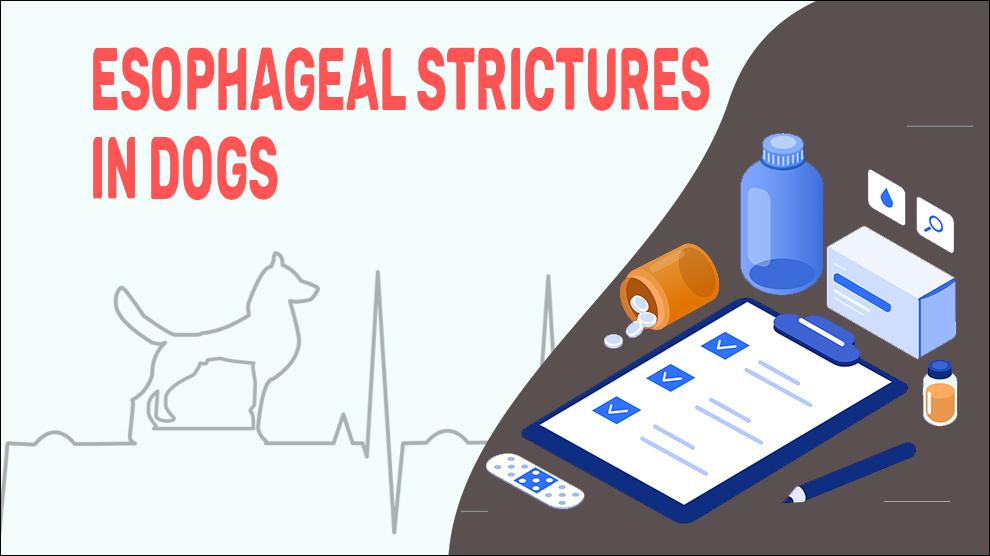What Is Esophageal Strictures In Dogs?
An esophageal stricture is an uncharacteristic thinning or tightening of the esophageal lumen. The esophagus is a wedge-shaped muscular tube connecting the mouth and stomach and its role is the physical transport of ingesta from the oral cavity to the stomach.
The esophageal mucosa is composed of partially keratinized, stratified squamous epithelium. A large number of mucous glands lie beneath the mucosa, secret mucus to lubricate and facilitate the transport of digesta.
The normal functioning esophagus (when there is food in the mouth) stirs nerves that fire signals to the brainstem swallowing center which in turn shoots the swallow reflex. When these reflexes are disrupted (due to any esophageal disorders or by neurological reasons), the ability to actively transport food by the esophagus is messed up losing all the tone and becoming enlarged.
In general, anything that damages the esophagus can cause inflammation with collagen deposition within the submucosa, which ultimately can lead to asymptomatic narrowing of the esophagus. Long-standing gastroesophageal reflux disease (GERD) is the most common cause of esophageal stricture and it accounts for at least 80% of cases.
Less common causes of an esophageal stricture include congenital esophageal strictures, treatment for esophageal varices (sclerotherapy or banding), eosinophilic esophagitis, esophageal surgeries, radiation therapy, caustic ingestions, and malignant tumors.
Symptoms Of Esophageal Strictures In Dogs
- Trouble swallowing/ Exaggerated or frequent swallowing
- Regurgitating food or water
- Excessive drooling
- Bad breath
- Anorexia (refusal to eat)
- Signs of distress, such as whining, moaning, or crying while eating
- Temporarily reduced appetite
- Hacking sounds to try to clear the throat
- Aspiration pneumonia- cough, fever, nasal discharge, lethargy, and poor appetite
Treatment Options For Esophageal Strictures In Dogs
The Treatment depends upon the underlying cause and extent/severity of the problem.
The vet may perform diagnostic tests to rule out other causes (eg abdominal x-rays, a fecal exam, urinalysis, or abdominal ultrasound).
Most GERD cases can be healed successfully using acid-blocking and gastro-protectant medications.
Check with your vet for the minimal effective medication level. If vets suggest for medications be discontinued, they should be done immediately.
Prostaglandin E1 analog: These medications may be considered if NSAIDs are required long term. Misoprostol (Cytotec, Arthrotec) can decrease the harmful gastric effects of NSAIDs.
Supplements: Quercetine Chalcone, L-glutamine, and probiotics to achieve optimal gut health.
Home Remedies For Esophageal Strictures In Dogs
There are no dependable home care methods to prevent esophageal disease in dogs, particularly since few of the common types are hereditary. But you can take steps to help your dog live a healthy life.
Healthy diet: Always feed your pup a healthy diet that includes Omega-3 Fatty Acids (fish oil) and Taurine (amino acid), Carnitine-rich foods, and Coenzyme Q10.
Herbs: Ginger, Hawthorn, Dandelion, Parsley, Cayenne.
Adequate exercise: Exercise is good for gut health.
Prevention Of Esophageal Strictures In Dogs
- Protect your dog from infections, ingestion of toxins, and hyperacidity.
- Use pain relievers regularly for dogs with caution.
- Use NSAIDsthat less likely to cause GI irritation.
- Avoid extreme exertion (sled dogs or other working dogs) as it can increase stomach acid that can overwhelm the mucosal barrier.
- Change your dog's diet to control excess production of stomach acid.
Affected Dog Breeds Of Esophageal Strictures
Terrier Dog Breeds, Young Dogs, Shar Pei, German Shepherd, Great Dane, Greyhound, Labrador Retriever, Irish Setter, Newfoundland
Additional Facts For Esophageal Strictures In Dogs
1. Causes:
- Congenital
- GERD
- Tracheoesophageal fistula
- Allergic—eosinophilic esophagitis
- Autoimmune—Crohn's disease, epidermolysis bullosa, graft versus host disease
- Neuromuscular disorder
- Tuberculosis
- Neoplastic
- Malignant—squamous cell carcinoma, adenocarcinoma
- Webs and rings—e.g., Shatski's ring, cervical esophageal web
- Sclerotherapy
- Iatrogenic
2. Types:
Congenital esophageal strictures:
Some breeds are predisposed to esophageal strictures due to congenital anomalies in the esophagus.
Acquired esophageal strictures:
This is generally caused due to a neuromuscular disease such as GERD, inflammation of the esophagus, an esophageal tumor, parasitic infections, a foreign body in the esophagus, or some form of toxicity.
3. Mortality:
Esophageal strictures in dogs due to cancer and toxins are fatal and the mortality rate is actually higher.
4. Diagnosis:
- Esophagram X-rays, contrast medium such as barium
- Fluoroscopy or endoscopy
- Electrical tests to assess the nerve-muscle connection
- Nerve-muscle biopsy
5. Prognosis:
The prognosis is excellent for benign causes (provided that the underlying cause can be treated successfully).
The prognosis may be more guarded if there have been complications to any of the vital organs. When there are tumors or abnormal cell growth, the outcome will depend upon the obliteration of the masses and overall the health status of your pet.
When To See A Vet For Esophageal Strictures In Dogs?
Right away transport your pet to the closest vet clinic, if you suspect drug poisoning or when your dog is showing any signs of distress.
- Trouble swallowing/ Exaggerated or frequent swallowing
- Regurgitating food or water
- Excessive drooling
Food Suggestions For Esophageal Strictures In Dogs
- Switch temporarily to a Bland Diet- Boiled, plain chicken and rice or with Plain, cooked sweet potato with small amounts of canned pumpkin.
- Try sensitive stomach diets for dogs with plenty of fiber ingredients, low amounts of fat, and probiotics.
- Provide easily digestible lean cuts of meat. - (boiled and drained off excess fat).
- semi-moist pet food with boiled chicken or Meat-flavored baby food.
- Low fat, plain yogurt.
- Avoid hard treats, kibble and biscuits.
- High-fiber foods: whole grain bread, rice, cereal, green beans, peas, Beet Pulp.
Conclusion
There is no separate treatment for Esophageal strictures. The treatment depends on the underlying disease or condition or any exposure to toxins. Obviously, recurrence of esophageal diseases is not possible after surgical procedures. Many dogs can live normal lives if they are without any other complications. Dogs with mild symptoms can be managed with medications.

















